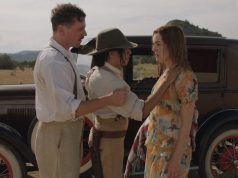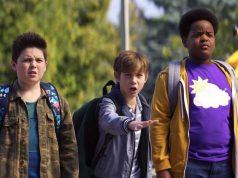The BBC was planning to make a boring ol’ documentary about Venezuelan president Hugo Chavez, but instead they got to film a coup! Talk about being in the right place at the right time.
Filmmakers Kim Bartley and Donnacha O’Briain were in Caracas for several months before the April 12, 2002, military coup. They’d been granted intimate access to Chavez, the charismatic, democratically elected president who cites Venezuelan liberator and hero Simon Bolivar as his idol. Under previous leadership, Venezuela’s economy had become so skewed that 80 percent of the population was poor while 20 percent was filthy rich. Chavez wanted to redistribute the wealth, making him popular with, oh, I’d guess 80 percent of the people and a villain among the other 20 percent.
He also wanted to get his country out from under the thumb of free-market policies imposed by the U.S. That and his communist leanings made Washington suspicious of him. His criticism of America’s post-9/11 bombing of Afghanistan — “You cannot fight terror with terror,” he says — clinched it: The U.S. was no longer his friend.
In the midst of this, parallel demonstrations emerged outside the presidential palace. The anti-Chavez marchers were there first, demanding he step down. The pro-Chavez group showed up later, and things were tense but manageable. Then snipers began firing on the pro-Chavez demonstrators from the rooftops, and all hell broke loose.
Bartley and O’Briain are there for all of it, and their film shows us the awesome power of television in the modern political arena. Chavez ensured that all TV stations were free to say whatever they wanted, but he used the state-run station to air a Q-and-A session with him every week, showing the people that he was a man of them. (Only fair, of course, if the privately owned stations were going to be criticizing him, that he get some face time, too.) After the coup, the anti-Chavez stations aired and re-aired footage of the demonstration that made it look like Chavez supporters were firing on the crowd. In fact, as Bartley and O’Briain’s footage — shot from another vantage point — shows, Chavez’s supporters were RETURNING fire on the snipers, and the streets below them were empty. The news media — run, just as in the U.S., by wealthy people — were among the 20 percent who didn’t like Chavez.
TV is crucial at every step, for both sides. When the Chavez cabinet ultimately regains power, they know the first thing they must do is get the state-run station back on the air so they can get the word out to the people. It’s no use quashing a rebellion if you can’t let people know you’ve done it, and nothing’s faster than TV.
In considering the impact of television on politics, I realize this: The average viewer of this film won’t know any more about Chavez or his country than the film tells them. Watching it, I get the sense that Chavez is a warm, friendly man who cares about the people he works for. Is that fact, or is that only what “The Revolution Will Not Be Televised” wants me to think? Have they manipulated truth the same way the anti-Chavez news stations did during the coup? Certainly there are people who believe they have. Some have even questioned the accuracy of the alternate-angle footage I mentioned earlier, saying it was doctored to make it look like the Chavez supporters were firing over empty streets, when in fact the streets were full.
Which is why the film works more as a starting point than as an end to itself. It’s impossible to know without having been there what really went on during those few days, and I suspect it would take several weeks of reading Venezuelan newspapers to get a feel for what kind of president Chavez is. Even then, it would be subjective: A lot of people read American papers every day and still have widely divergent feelings about George W. Bush.
So what is the movie? It’s an account of a historical event, shot while it happened by a film crew. It does not have obvious signs of bias one way or the other, and it more or less lets the players speak for themselves. It gives us a sense of Venezuela’s political and social climate in April 2002, and in that regard it is most fascinating.
B (1 hr., 14 min.; in English and Spanish with subtitles; )





